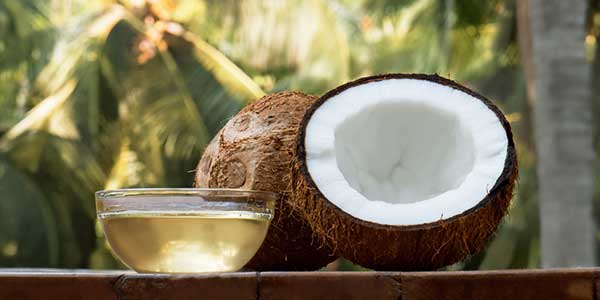
A new report from the American Heart Association (AHA) caused quite the ruckus in the health world after strongly concluding "lowering intake of saturated fat and replacing it with unsaturated fats, especially polyunsaturated fats, will lower the incidence of CVD." But the stir of coconut oil and the saturated fat it contains is not necessarily based on new ingredients, but evidence already added to the mix and served on a plate as a second helping. But why did people attribute coconut oil as healthy in the first place and is it actually healthy?
Why You Thought Coconut Oil Was Healthy
Coconut oil's popularity in the health world sparked based on its...
...marketing and publicity.
Coconut oil's claim to fame intrigued health enthusiasts, as coconut oil is and was touted as a "superfood." But superfoods should be warned with caution, as individuals should select and consume foods based what they are proven to do for the body, not solely based on hype.
...medium-chain fatty acid content.
In addition to being a rich source of saturated fat, coconut oil contains medium-chain fatty acids (MCFAs). Fatty acids come in short, medium, and long lengths, further showing to behave differently in the body. Compared to long-chain fatty acids (LCFAs), short and medium-fatty acids are more easily absorbed and lessen their risk of circulating and depositing themselves within the body. Additionally, coconut oil contains medium-chain triglyceride (MCT) oil, fat produced following the processing of coconut or palm kernel oils. MCT oil's marginally lower calorie content (8.3 calories per gram compared to 9 calories per gram in long-chain triglycerides) appeals to dieters aiming to cut calories. MCT oil also displays antimicrobial and antiviral properties and has been researched in treating and reversing heart disease, diabetes, and Alzheimer's disease.
...promotion as a vegan fat source.
Being plant-based, coconut oil is a safe alternative to butter and other fats stemming from animal products. Too many times, people associate vegetarian and vegan-friendly products as "healthy" without fully understanding (or even disregarding) the contraindications they may exhibit.
But Is Coconut Oil Healthy?
When it comes down to it, coconut oil is not the miraculous "superfood" we hope or wish it to be, but nor is it deterrent to health. Although swapping out saturated fatty acids with unsaturated fat sources shows to lessen the risk of inflammation and heart disease, coconut oil has shown to be beneficial to health, particularly when consumed in moderated amounts. But the concept of moderation is stressed well beyond fat, as evidence shows a high intake of sugar can increase triglycerides and the "bad" cholesterol. Instead of continuously demonizing fat in its relation to contribution to weight gain and heart disease risk, we should not dismiss the outrageous volume of sugar consumed within an Americanized diet. Ultimately, the general U.S. population can benefit from lessening the consumption of high-fat and sugar food products and focusing on the whole diet, rather than attributing the causes of "good" or "bad" health to one single food. And with any promoted "superfood," nutrition experts encourage individuals to not fall into the hype without taking the science and professional guidelines into consideration.
If searching for a diet solution, look no further than bistroMD! Founded by bariatric physician Dr. Caroline Cederquist, bistroMD is doctor-designed and scientifically-proven to provide you with real results. Each meal provides a scientific balance of complex carbohydrates, whole grains and fiber along with lean protein and healthy fat ratios. Each meal contains 1,100 to 1,400 calories daily with 40 to 50 percent of total caloric intake from lean, adequate protein, 20 to 25 percent of calories from healthy fats, and 30 to 35 percent from complex carbohydrates. The balance of macronutrients provides the body with what it needs to jump start your health goals! Find more information on bistroMD and offered programs by visiting the official website or calling 866-401-3438!





